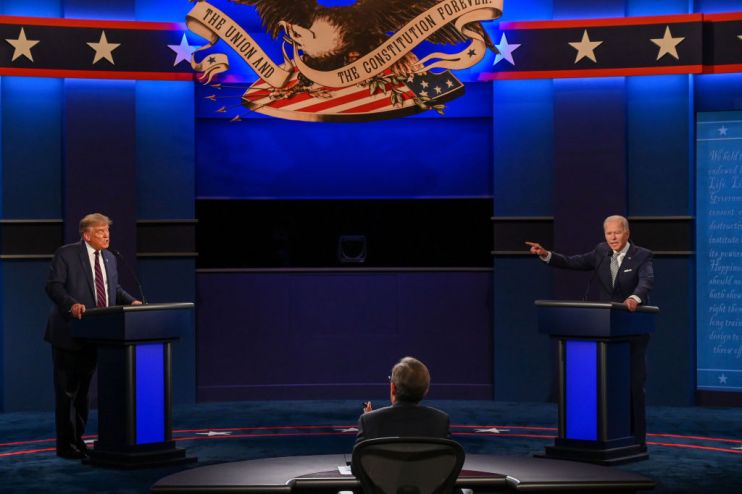Trump or Biden? Either way, global Britain should prepare to step into the void

US presidential elections are always closely watched across the pond.
This time round, in an exceptional year and following a truly extraordinary administration, the anticipation building in Westminster around next month’s vote has reached a fever pitch.
The dramatic twists and turns of American foreign policy over the past four years have heightened anxieties about the possibilities of a second Trump term – during which the dysfunction, ambiguity and unpredictability the President has injected into the system could become embedded as a new status quo.
With Democratic candidate Joe Biden promising to reinstate America’s global standing, the risks and rewards on the table for America’s allies on 3 November feel especially stark.
But the UK should remember that, whatever the result, the game has fundamentally changed.
The Trump presidency has been troubling for the United Kingdom. The President’s reticence towards global governance and disdain for international institutions, as well as the degradation of his relations with other European leaders, has placed the “special relationship” Britain has always prided itself on squarely in the spotlight.
Although the substance of this relationship — in essence, an enduring security partnership — has remained robust throughout the political churn, there has been a fundamental erosion (at least on the UK side) of the structural underpinning of its success: namely, the mutual respect of its people. Over the past four years, Brits, along with their counterparts in Europe, have lost faith in America’s morality as a global actor and the functioning of its democracy.
A Biden victory will inevitably represent a step change in the tone and substance of America’s foreign policy. The restoration of the United States’ commitment to multilateralism, to the western alliance, and to its moral leadership on the world stage will be meaningful — and quickly realised. There can be no doubt that the stakes are high, and that a Biden win will herald some degree of reversal.
Nonetheless, those anticipating a return to the status quo of the Clinton or Bush years, or even to the early days of the Obama administration, will be kept waiting. The structural realities of America’s domestic social landscape and the instincts guiding its foreign policy have evolved dramatically over the past decade. Its people have been conditioned to question the self-interest in America’s traditional role as an interventionist power.
Should he win, Biden will need to triangulate between the needs and priorities of a diverse coalition, many of whom will carry a high degree of scepticism towards an active American foreign policy — albeit motivated by very different world views.
Moreover, the upheaval that epitomises the Trump era is not only a story about America. This bombastic President came to power in a time when many other advanced democracies were experiencing profound tensions and conflicts in their own social fabric and political settlement.
Only months before Trump’s seismic victory, Westminster was blown apart by the EU referendum and the chaos that followed in its wake. The following year, France’s Emmanuel Macron and his new centrist party would come to power in a dramatic, high-risk election against the far-right Front National, while long-standing German Chancellor Angela Merkel would barely scrape through in national elections amid resurgent fringe parties on the left and the right.
The bodies that were brought up in these extraordinary elections cannot simply be re-buried. The period of maximalist globalisation has come to an end. Politicians must now recognise and be responsive to the anxieties their citizens feel towards social and global change, and the asymmetrical costs and benefits of internationally connected economies.
These new parameters for domestic governance also bear consequences for foreign policy. The constrained choices they permit will render a return to the foreign policy dogma of the old world order an inconceivable feat.
Undoubtedly, a second Trump victory would perpetuate this trend and further increase the pressure on the UK to take a more prominent, central role in the governance of multilateral institutions and the functioning of liberal partnerships. But it is difficult to argue that this responsibility will entirely diminish even with Biden as President. Whichever candidate enters the Oval Office in January 2021, the strong pull of America’s fragile domestic settlement will consume primary political attention.
There will be a vacuum in the international community that Britain is uniquely trusted to seek to fill. America is not going back — so neither can we.
Main image credit: Getty
